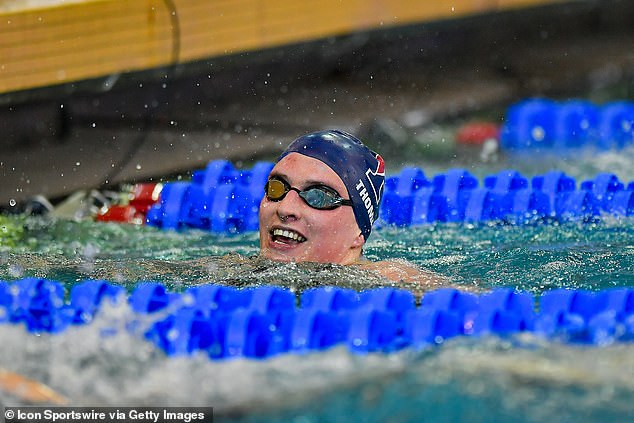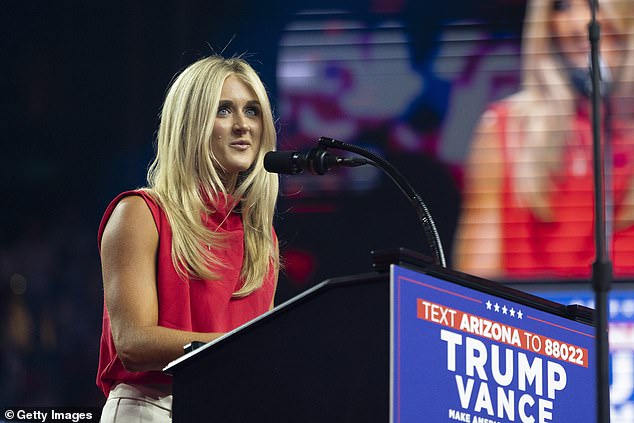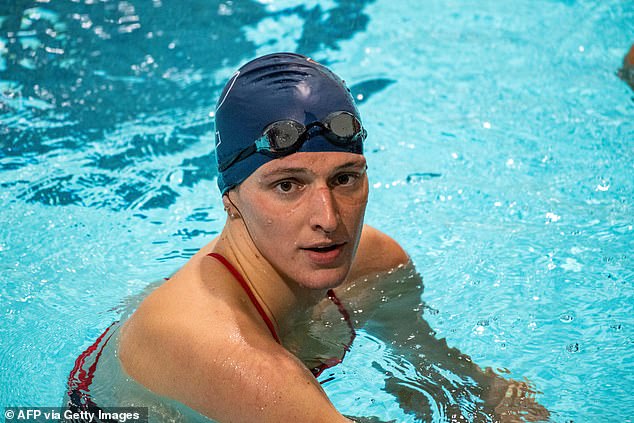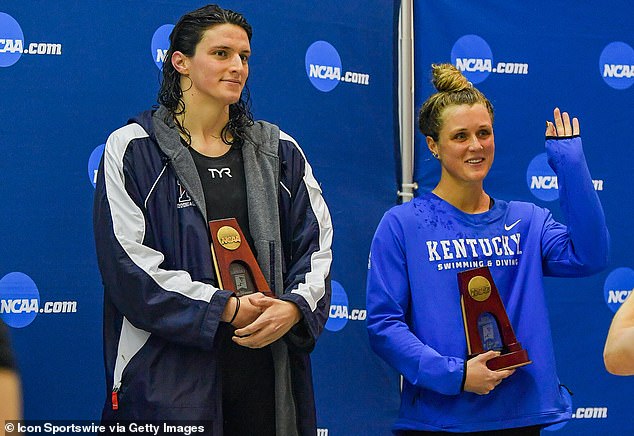The University of Pennsylvania has bowed to Donald Trump’s Department of Education by agreeing to resolve Title IX violations over transgender former Quakers swimmer Lia Thomas.
The Department of Education announced Tuesday that Penn is adopting strict definitions for male and female competitors under White House guidelines and will erase Thomas from the school’s record books. Furthermore, swimmers impacted by Thomas’ inclusion in women’s NCAA competitions will be retroactively awarded victories and will receive an apology from Penn.
The Ivy League institution’s decision comes after the Trump administration suspended $175 million in federal funding to Penn – money that had been earmarked and funded through the Defense Department and the Department of Health and Human Services.
Thomas won a national title as a woman in the 500 free while tying for fifth in the 200 free at the 2022 NCAA Finals with Kentucky swimmer Riley Gaines, who has since become the face of the movement to ban trans athletes from female sports.
The NCAA previously allowed each sports to govern transgender inclusion, generally deferring to national governing bodies or International Olympic criteria. It was under that structure that Thomas was allowed to compete despite originally swimming as a man before receiving hormone replace therapy. She returned as a woman in 2021 after meeting the NCAA’s hormone requirements at the time.
Since then, the NCAA has changed its policy to conform with Trump’s February 5 executive order aiming to ban transgender athletes from girls and women’s sports.
Transgender woman Lia Thomas (L) of the University of Pennsylvania stands on the podium after winning the 500-yard freestyle as other medalists in March of 2022

University of Pennsylvania swimmer Lia Thomas reacts after winning the 500 Freestyle finals during the NCAA Swimming and Diving Championships on March 17th, 2022 in Atlanta
Gaines was among the first to issue a statement on the ruling Tuesday.
‘From day one, President Trump and (Education) Secretary (Linda) McMahon made it clear that protecting women and girls is a top priority—and today’s agreement with UPenn is proof of that commitment in action.’
‘This Administration isn’t just talking about women’s equality, but instead actively defending it. I hope this sends a clear message to educational institutions: you can no longer disregard women’s civil rights. And to every female athlete, know this: your dignity, safety, and fairness matter, and our nation’s leaders will not stop fighting for them.’
The NCAA changed its policy on February 6 after Trump signed an executive order on banning transgender athletes from girls’ and women’s sports.
Thomas was banned from competing in elite women’s races ahead of the Olympics by The Court of Arbitration for Sport panel, which ruled that she was ineligible to challenge World Aquatics policy on trans athletes.
Now, according to the statement released by the Department of Education, Thomas’ records at Penn are being expunged as well.

Thomas won a national title as a woman in the 500 free while tying for fifth in the 200 free at the 2022 NCAA Finals with Kentucky swimmer Riley Gaines (pictured)
‘UPenn has signed OCR’s Resolution Agreement to resolve its Title IX violations, which requires UPenn to undertake the following action items:
- ‘UPenn will restore to female athletes all individual UPenn Division I swimming records, titles, or similar recognitions which were misappropriated by male athletes allowed to compete in female categories;
- ‘UPenn will issue a public statement to the University community stating that it will comply with Title IX, specifying that UPenn will not allow males to compete in female athletic programs or occupy Penn Athletics female intimate facilities;
- ‘The statement will specify that UPenn will adopt biology-based definitions for the words ‘male’ and ‘female pursuant to Title IX and consistent with President Trump’s Executive Orders ‘Defending Women from Gender Ideology Extremism’ and “Keeping Men Out of Women’s Sports”;
- UPenn will post the statement in a prominent location on its main website and on each of its websites for women’s athletics; UPenn will rescind any guidance which violated Title IX, remove or revise any internal and public-facing statements or documents that are inconsistent with Title IX, and notify all staff and women’s athletics of all such rescissions; and
- UPenn will send a personalized letter of apology to each impacted female swimmer.

Lia Thomas was ultimately denied the chance to challenge World Aquatics’ trans ban
Thomas is, arguably, the most visible trans athlete in the modern debate over their presence in women’s and girls’ sports.
Growing up in Austin, Texas, Thomas began swimming at age 5 and only got better with the passing years.
At Westlake High School, which produced Super Bowl-winning quarterbacks Drew Brees and Nick Foles, Thomas earned a sixth-place finish among teenage boys at the Texas state championships.
Colleges quickly took notice.
Thomas ultimately followed her brother to Penn’s swim team, where she began focusing on distance races – and her growing unease with her own body.
She’d already begun questioning her gender in high school, but those feelings only intensified at the Ivy League college in Philadelphia.
Of course, nobody would have guessed there was a problem judging by Thomas’ results. Although Gaines has characterized Thomas a ‘mediocre male athlete,’ the Austin native’s career bio tells a different story.
While competing under her birth name, Will, Thomas recorded the sixth-fastest national time in the men’s 1,000-yard freestyle in 2017 (57.55 seconds), and had several other impressive performances in the 500-yard freestyle and 1,650-yard freestyle.
Thomas was even better the following year, finishing second at the Ivy League Championships in the men’s 500 freestyle, 1,000 freestyle and 1,650 freestyle.
But although Thomas was still racing as a man in the spring 2019, she was already beginning to identify as a woman. In fact, Thomas came out to her family as transgender a year earlier, in the summer of 2018.
As she told Sports Illustrated in 2022, Thomas initially put off hormone replacement therapy (HRT) fearing that it would interfere with swimming. Even when she began the treatments in May of 2019, Thomas knew her career in the pool was in jeopardy.
‘I did HRT knowing and accepting I might not swim again,’ Thomas told SI. ‘I was just trying to live my life.’
But while the treatments were a slow process, the results were undeniable for Thomas, whose unease over her gender dysphoria began to subside.
‘It surprised me,’ Thomas said of her transition. ‘I felt, mentally, a lot better and healthier pretty quickly. The relief it gave me was quite substantial.’
To Thomas, transitioning was the right answer. Not only was she comfortable with her new body, but her family, friends, teammates and coaches remained largely supportive of her decision.
She was still competing as a man in 2019-20, occasionally wearing a women’s swimsuit, but her times suffered dramatically due to the HRT treatment. Ultimately Thomas raced in only four of eight regular-season events that year, and outside of a win in the 500 freestyle against Villanova, was a non factor for the Quakers.
With her testosterone levels dropping, Thomas decided to move to the women’s division, not just for herself, but for other trans athletes facing the same obstacles.
‘I just want to show trans kids and younger trans athletes that they’re not alone,’ Thomas told SI. ‘They don’t have to choose between who they are and the sport they love.’
There was, of course, some pushback.
Even LGBTQ+ icon Martina Navratilova took issue with the trans swimmer, reposting a DailyMail.com article on Twitter and writing: ‘It is not fair for women to race against transgender Lia Thomas.’
At the time, the NCAA was requiring transgender women to go through one year of HRT treatment before being able to compete in women’s sports, and Thomas coordinated with both Penn and NCAA officials to ensure that she remained compliant.
Those policies quickly became more complicated.
In January of 2022, the NCAA announced it would defer to the rules of each sport’s governing body when it came to trans athletes in women’s sports. USA Swimming followed by updating its own criteria, requiring trans women to have minuscule testosterone levels for 36 months in order to compete in the women’s division.
Regardless, Thomas remained eligible while posting the best 200-meter freestyle time in the country as the NCAA was beginning its own transition from the imperial to the metric system.
In one race, she beat the nearest competitor by 40 seconds.
The national media soon became fixated. As a result, her final home meet in Philadelphia required additional media seating as national and international news outlets hashed out the growing controversy.
Meanwhile, outside Penn’s Sheer Pool, protestors had begun chanting against Thomas’ inclusion in women’s swimming.
‘Stand up for women!’ they shouted, as quoted by The Associated Press. ‘Even when they’re swimming! Men cannot be women!’
There was even discord within the Quakers’ locker room, where some teammates, like Paula Scanlan, were growing uncomfortable.
‘Is anyone going to apologize for forcing us to undress with him 18 times a week?’ asked Scanlan, who testified on the subject before a congressional subcommittee in 2023.
While Thomas has insisted coach Penn Mike Schnur and teammates were ‘unbelievably supportive,’ a letter purportedly signed by 16 anonymous Penn athletes was sent to the NCAA demanding that she not be allowed to compete in the national championships.
Penn and the Ivy League followed by issuing their own statements in support of all transgender athletes, and Thomas ultimately moved on to the biggest meet of her career: The 2022 NCAA Championships.
Swimming in the 500-yard freestyle, Thomas would post an impressive 4:33.24, beating Olympic silver medalist and University of Florida star Emma Weyant by 1.75 seconds to finish first overall.
However, the victory was marred by a flurry of boos in the crowd, and one spectator’s decision to yell ‘cheater’ while Thomas was on the block, according to Swimswam.com. And as Thomas was finishing the 500 with 11th fast time in NCAA history, another spectator yelled ‘he’s a man’ and ‘protect girls sports!’

Scanlan, Thomas’ former University of Pennsylvania teammate, took to social media shortly after verdict was revealed to demand an apology
But for all of Thomas’ supposed advantages, her time in the 500 freestyle was still nearly 15 seconds slower than her personal best in the men’s division (4:18.72). And while 27 all-time NCAA records were broken at the 2022 championships, Thomas’ performance in the 500 was still far from Katie Ledecky’s collegiate best of 4:24.06.
Curiously, Thomas’ best times in the men’s and women’s 500 freestyle are both about 10 seconds off the NCAA records in each respective division.
But while much of the data remains inconclusive, many public figures are certain that Thomas had an unfair advantage.
Republican Florida Governor Ron DeSantis released a proclamation after the NCAA championships, declaring Weyant to be the winner of the 500 freestyle.
‘By allowing men to compete in women’s sports, the NCAA is destroying opportunities for women, making a mockery of its championships, and perpetuating a fraud,’ DeSantis wrote on X.
Colorado congresswoman Lauren Boebert introduced a bill honoring Weyant.
Even gold-medal winning Olympic decathlete Caitlyn Jenner — who is, herself, a trans woman — came down strongly against Thomas: ‘It’s not transphobic or anti-trans, it’s common sense!’

Thomas alongside Kentucky’s Riley Gaines after both tied for fifth at the NCAA championships
For many politicians, the debate over Thomas became a springboard for wide-ranging legislation at the high school level. By June of 2022, 19 conservative-leaning states all enacted some legislation prohibiting public schools from allowing trans girls to participate in girls sports.
House Republicans then passed a bill banning transgender athletes from competing on girls or women’s sports teams at federally supported schools and colleges, but that — and other similar legislation — is not expected to pass the Democrat-led senate.
Thomas has largely avoided the media over the last few years, even while being ripped in the press by critics such as Jenner and Gaines, both of whom have emerged as leading voices on the other side of the debate.
And to Thomas, that may have been the point: She can’t do anything about her critics, but she can still live whatever life she chooses for herself.
‘I knew there would be scrutiny against me if I competed as a woman,’ Thomas said in June of 2022. ‘I was prepared for that. But I also don’t need anybody’s permission to be myself and to do the sport that I love.’


